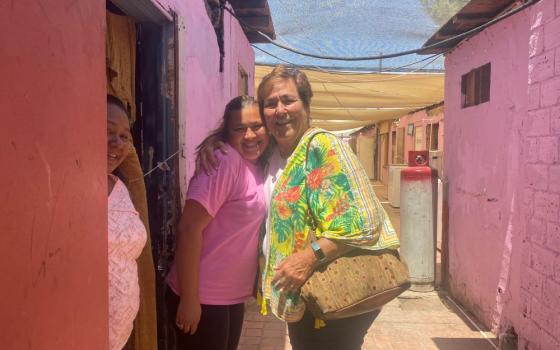WASHINGTON -- Catholic Charities USA has called for a nationwide effort to develop affordable housing options for low- and moderate-income people as they face mounting pressure to keep a roof over their heads.
Focusing on the housing crisis gripping the nation, the agency is seeking a broad plan that would see partnerships develop between local, state and federal governments, nonprofit housing groups, developers, philanthropic leaders and faith-based organizations including diocesan Catholic Charities agencies.
"The lack of affordable housing is one of the most pressing needs of the country," Father Larry Snyder, Catholic Charities USA president, said in introducing an afternoon-long program Sept. 26 at the agency's annual gathering in New Orleans and to a nationwide audience watching on the Internet.
Father Snyder said the needs span all regions of the country and all types of communities, including rural, suburban and urban.
The Catholic Charities executive called for developing a nationwide policy and finding the financial resources "so children have a place to sleep at night," especially as the country deals with the biggest financial challenge since the Great Depression.
Tied with the agency's Campaign to Reduce Poverty in America, the program was billed as a national housing summit and featured several advocates for affordable housing. It also gave local Catholic Charities staff members a chance to meet by region to discuss new ways they can respond to urgent housing needs.
In conjunction with the program, Catholic Charities released a draft document titled "The Home Is the Foundation." It spells out the difficulties low- and moderate-income families and individuals are facing as home foreclosures mount and sets forth a broad outline for solutions ranging from tax policy and various options for housing development.
Pressure in the housing market is moving downward as people who lose homes because of foreclosure re-enter the rental market, Henry Cisneros, former secretary of the U.S. Department of Housing and Urban Development, told the gathering.
With an already dire shortage of affordable housing, the cost of rental units is rising even higher, forcing people at the low end of the economy to spend more of their income on housing.
Cisneros, chairman of CityView, a Los Angeles-based investment company that finances homebuilding in urban centers, challenged the current nationwide trend of building large, expensive homes in exurbs, communities far beyond the central city.
He called for a national housing policy that provides incentives to develop housing in urban cores so that people of moderate means can have a safe, affordable place in which to live with easier access to mass transit and employment opportunities.
Explaining that homeownership is the gateway to the middle class, Cisneros said many people, especially minorities, are unable to afford their own homes, limiting their opportunity to advance up the economic ladder.
Citing statistics showing that 74 percent of whites owned homes at the peak of the most recent housing boom while 49 percent of African-Americans and Hispanics owned their homes, Cisneros said the country risks creating what he called "a homeownership gap."
"In entry-level homeownership, we made great strides in the last decade," he said. "But I worry (that) at the end of this crisis the country will blame the push for homeownership and we will take our eye off the need (for affordable housing) that we have."
Housing policy also should call for providing basic housing for the 800,000 people who are homeless each night across the country, the former HUD secretary said. Faith-based organizations such as Catholic Charities can urge policy changes that provide for subsidized housing and other supportive services for homeless people, 70 percent of whom have AIDS, mental illness or physical disabilities, he said.
"Everyone needs a place to live," Cisneros told the gathering.
"Catholic Charities has a substantial road ahead in trying to respond to the realities that have been created," he added.
In regional breakout sessions, local Catholic Charities staff members discussed ways they could come together to promote the need for affordable housing while reviewing many of the successes agencies across the country have had in developing affordable housing for low-income and elderly people.
In several of the sessions, also broadcast on the Internet, staffers called for broad economic policy changes that impact the minimum wage, rental subsidies and tax credits for low-income people, the need for transitional housing and education assistance.
The discussion in the Midwest regional meeting touched on how renters do not get the same attention as homeowners from political leaders. The consensus was that Catholic Charities and other advocates can step up to make local officials aware of local affordable housing needs and urge that their actions benefit the entire community.
- - -
Editor's Note: Catholic Charities USA's draft of "The Home Is the Foundation" is available online at www.catholiccharitiesusa.org/NetCommunity/Document.Doc?id=1105.




